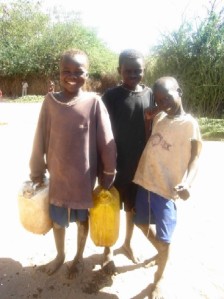
Volume 1, Issue 1 / December 2008
The children look emaciated, tired, and older than their real age. A look in their faces will tell you that they lack much hope for their future lives. These are the children who labor throughout Kakuma Refugee Camp as household help. I happened to meet some these children and had the opportunity to interview them about their lives. I came to the conclusion that most youth don’t work for sheer pleasure, but only so that they may eke out a living.
Most of the children I met come from the local Turkana community, although some are also from the refugee camp. The Somali and Sudanese communities are most affected in this respect.
Working children wake up very early in the morning to start their daily chores and activities. The jobs they perform include such chores as fetching water, washing clothes, cracking stones, fetching or draining sewage water, washing utensils in hotels, making bricks, and keeping the employer’s compound clean. They also labor at other, heavier duties such as carrying food rations from the food distribution centers to employers’ homes. Girls carry these rations on their heads while boys push them in wheelbarrows. Rations are heavy and can become too wearying to carry, but it is not the employer’s business to care whether or not the load is too heavy for the child. Instead, their concerns are only to see to it that their rations have been delivered safely to their home.
Poverty has dramatically altered these children’s lives, and is the major contributing factor to child labor in Kakuma. Most working children are bread winners for their family. Families do not attempt to stop their work, but instead rely heavily on the children for food and other basic needs. Though some children do attend school, most do not. Their guardians do not encourage them to attend school because they know that if their children attend school and do not work, they may go to sleep hungry that day.
What about the refugee children? If they receive food rations from the UNHCR, why do they still work to earn money for food? The answer to this question lies in system of food rationing: the rations distributed to families simply do not last long enough. Refugees collect rations twice a month, but the allocated food supplies are too small to keep them healthy until next collection day. This pushes some refugee children to work so that they can supplement their meager food rations with a small salary.
Some children work as a result of peer pressure from other working children. Once they see that their friends have some money, they also involve themselves in child labor. Other children are orphans and have no one to care for them, leaving them with no option but to hustle for their lives. Still others came to Kenya without relatives, and life was unbearable until they began working to feed themselves.
Collectively, these children call themselves “survivors.”
